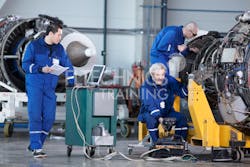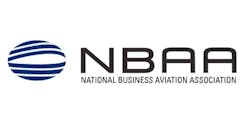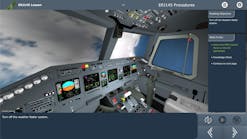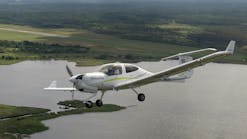Will Workforce Issues Sink the Middle Eastern Aviation Industry?
With a carefully adopted liberalization strategy and steadily developing tourist industry supporting the high demand for air travel, the Middle East has successfully secured a strong position among the top leaders of the aviation industry. As a result, the region has developed a strong demand for new aircraft, as well as its appropriate support from the MRO sector. Still, as it takes people to power MRO, will the inability to timely address the shortage of qualified, locally trained maintenance talent bring the on-going growth to a stop?
The Middle East continues to be a great success story in the aviation industry. Aviation growth in the region has already outpaced the global average and is expected to continue its rocketing development, supported by a variety of growth strategies, including alliances, partnerships ,increased activity of low cost carriers, and, of course, fleet expansions.
As a result, according to various statistics, Middle Eastern airlines will need over 2,600 new aircraft over the next 20 years, 60% or more of which will be used for fleet expansion. Consequently, experts believe the region’s MRO market will need 53,700 new technicians to fuel the growth. Thus it comes with no surprise that 74% of airlines and independent MRO respondents in the region expect to recruit new engineering and technical personnel within the next 1-5 years, according to the survey, recently conducted by Aviation Week. Most of the local players state that they will try to employ more than 100 additional staff members. However, the problem is that no Middle East technical training providers who answered the survey think they will be able to provide enough licensed engineers and technicians to meet the area's forecasted growth.
“With a positive outlook for air traffic demand and on-going fleet renewal, the Middle East has attracted the attention of the MRO providers all over the world for some time now. Until now the regional industry has been able to maintain a necessary balance, as the MROs in the Middle East are pretty confident that their existing workforce still meets today's needs and is capable of fully supporting their operation satisfactorily. However, the constantly increasing demand for new aircraft means that the providers will inevitably face the raise in demand for their support. As deliveries roll out, maintenance organizations must propose appropriate solutions,” comments Kestutis Volungevicius, the Head of FL Technics Training.
Meantime, low salaries and highly complex regulations impede young talent from entering the MRO profession in the region. As for those who still choose to become aircraft mechanics or engineers, they find it difficult to get some relevant on-the-job or practical training, as well as to find jobs within a reasonable timeframe. One of the reasons for that is that usually regional MRO providers want a type-rated recruit with at least one year of experience and speaking multiple languages.
“What the region seems to lack is proper communication and cooperation between the MRO and training providers. The training providers, airlines and the independent MROs in the Middle East have to realize that they’re in it together; they need each other’s products and support,” the head of FL Technics Training shares his thoughts. “Developing a regional technical workforce that can sustain growth is a challenge, but it always provides higher-quality production and lower overall labour and training costs, if conducted successfully. Otherwise, the deficiency of skilled professionals will definitely take its toll, as this is a global problem that cannot be solved by merely hiring people from other regions.”
About FL Technics Training:
FL Technics Training is a provider of technical training for the aviation industry. The company offers comprehensive training services including basic training and examination, aircraft type training and specialized training for aircraft maintenance technicians as well as administrative and management personnel. FL Technics Training is part of an integrated aircraft maintenance and repair organization (MRO) FL Technics.
Based in Vilnius, Lithuania, FL Technics Training is certified as a European Aviation Safety Agency (EASA) Part-147 training organization providing courses for basic, aircraft type training and customized training programs designed according to individual client requirements. The company serves a wide range of customers from Europe and the CIS (Poland, Romania, Ukraine, Moldova, Russian Federation etc.), Asia-Pacific (including South Korea, Pakistan, Kazakhstan, Tajikistan, and etc.), Africa, Cuba and other regions.
Drawn up in accordance with the requirements of the EASA, FL Technics Training programmes cover four areas: basic training, aircraft type training, specialized aviation training and consulting services. FL Technics Training offers training for diverse aircraft types: Airbus A318/A319/A320/A321, Airbus A380/340/330, ATR 42 - 200/300, ATR 72 - 100/200, Boeing 737 - 300/400/500, Boeing 737 - 600/700/800/900, Boeing 757 - 200, Boeing 767 - 200/300, Boeing 747/777/767, Saab – 340, Saab – 2000, Bombardier CL-600-2B19.
FL Technics Training offers specialized training programs of general interest for technical as well as administrative personnel from Engineering and Planning, Quality system, EASA Regulation Part-145 and Part-M to Fuel Tank Safety courses. Training programs can be adapted to meet the specific needs and requirements of clients.
More than 3,000 students for over 45,000 hours per year are trained at the company's theoretical courses in Moscow, Tyumen, Alma Ata, Vilnius and London. Training on the job is executed in Vilnius, Kiev and London.
For further information please visit website http://www.fltechnicstraining.com/





